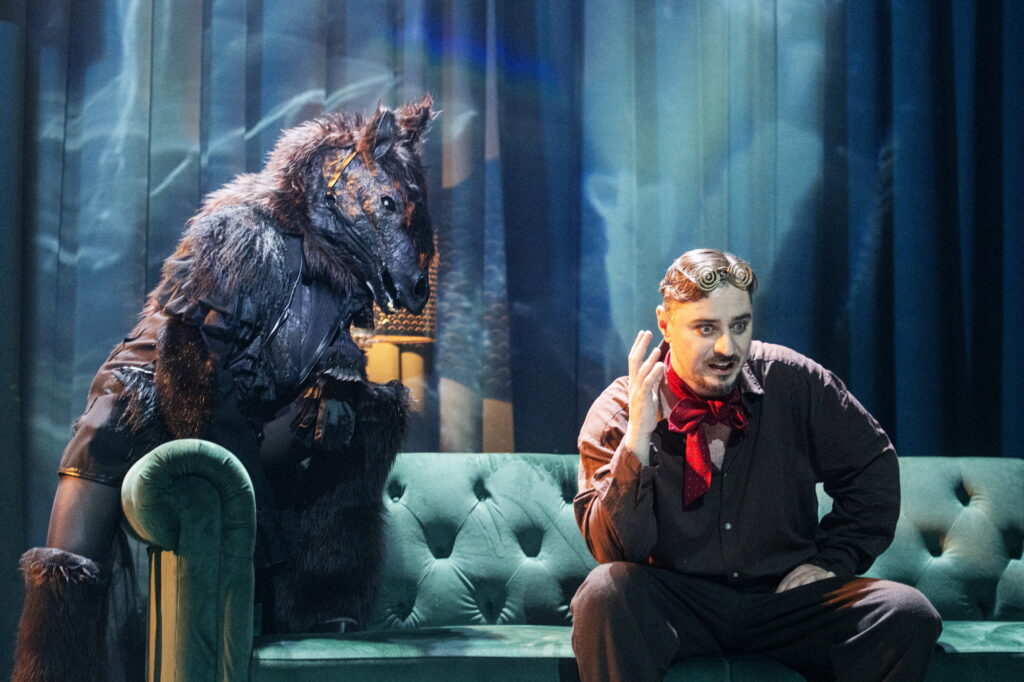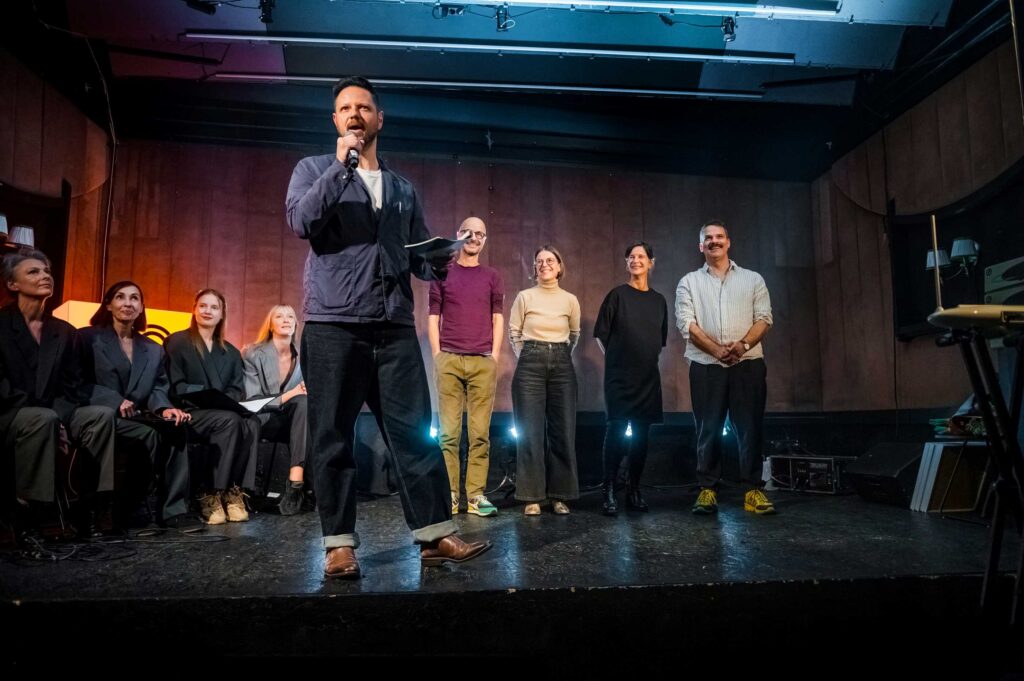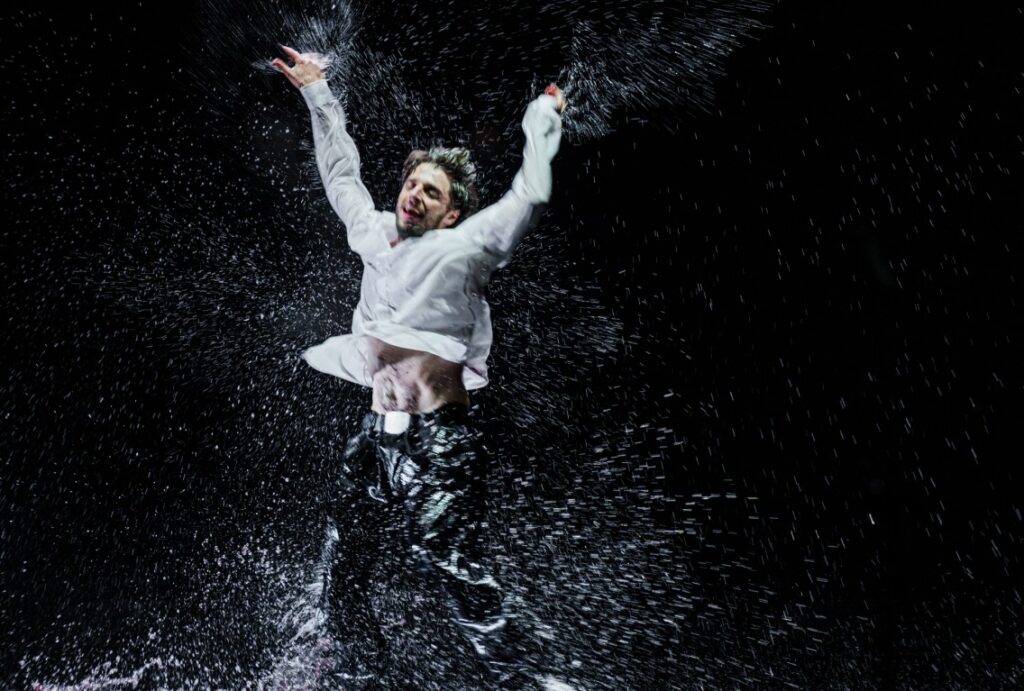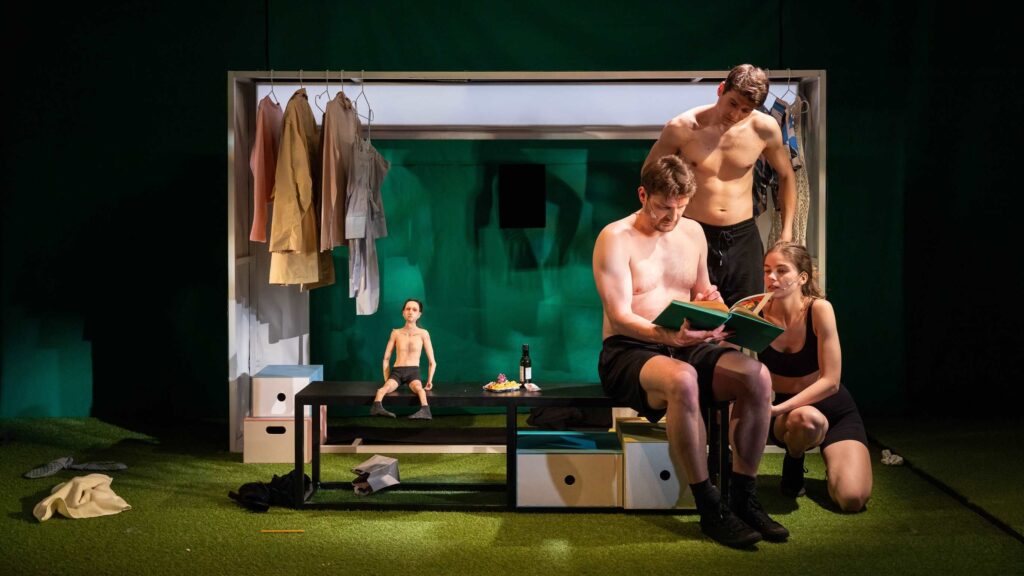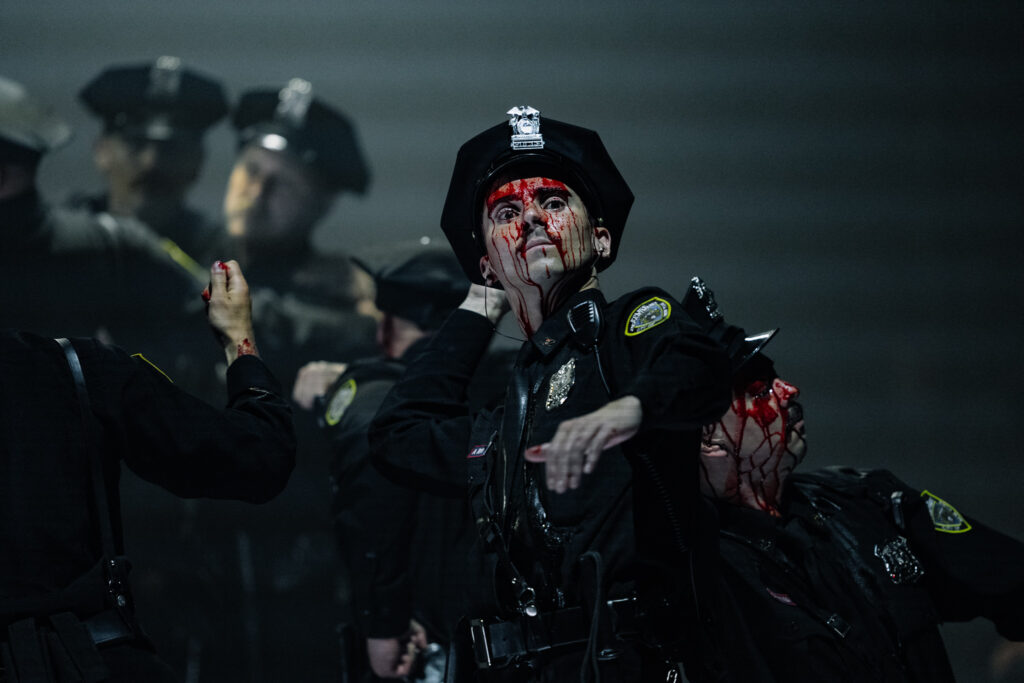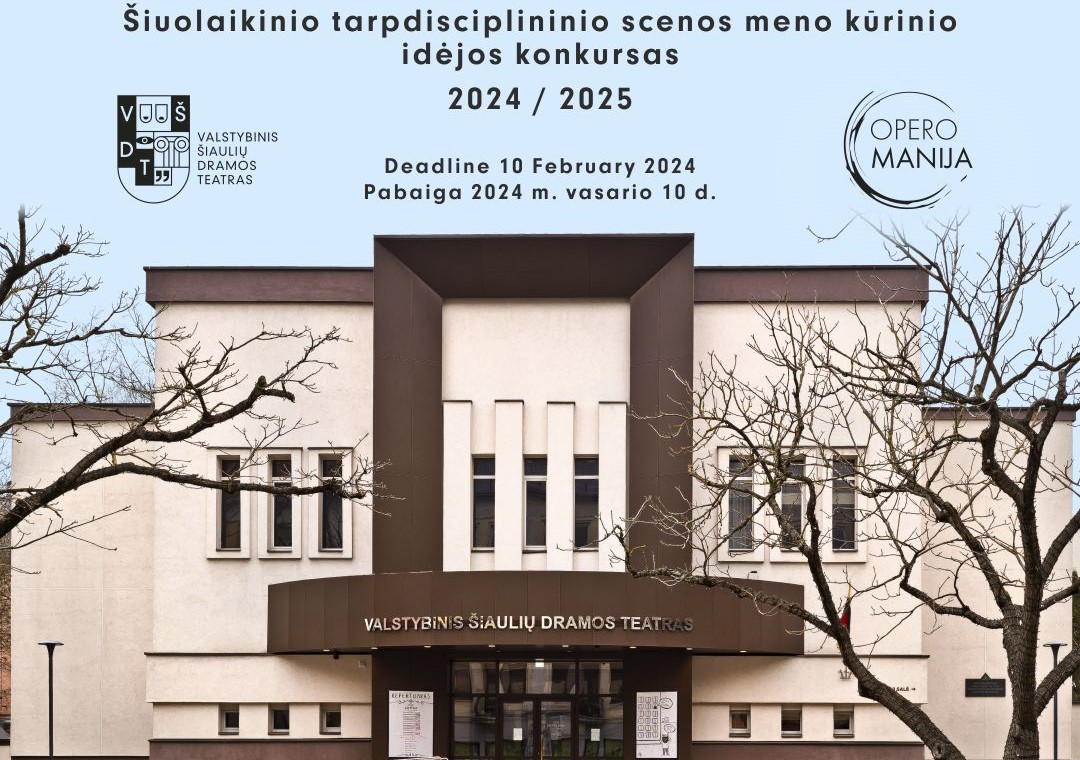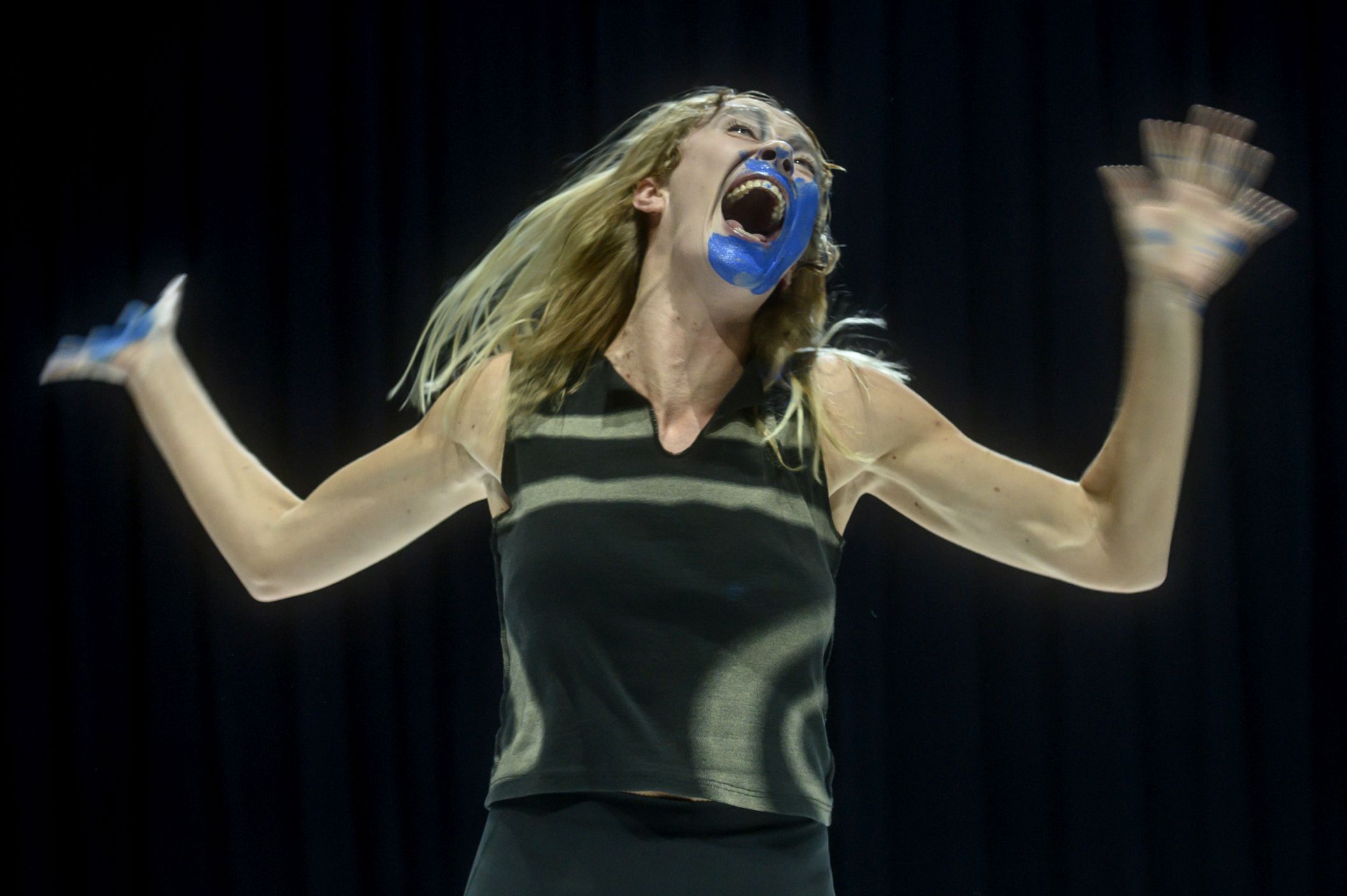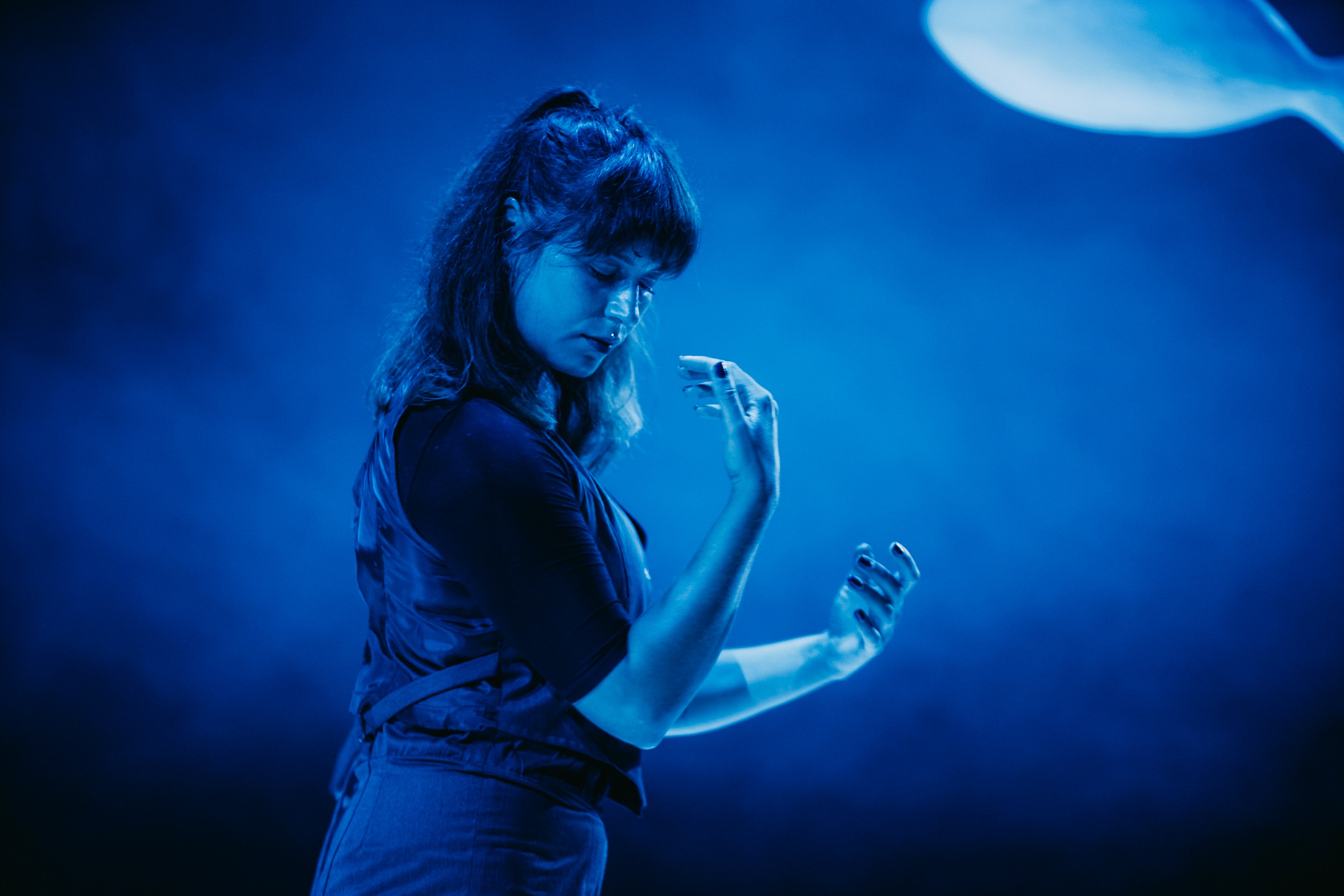* Never take season reviews seriously. They are just the subjective thoughts of one person, who may have gone somewhere completely by accident, and may have accidentally not gone somewhere.
** Perhaps this is not a season review. Maybe it is just a list of works I would like to see a second time. I will not mention the ones I would not go to: it is summer, after all, and there is an etiquette of good humour to observe.
-----
While writing a review of the Lithuanian (or, to be more precise, almost exclusively Vilnius-based) theatre season, I am watching Jean Cocteau’s “Jean Cocteau speaks to the year 2000”. I stop at the part where he talks about Gabriel Voisin’s aircraft factory. Jean says he asked Gabriel why his latest planes seem to be the least successful. Gabriel replied: “It is very simple - we made a mistake. We started with the wings. In other words, we did not build anything that would match the wheel. It would have been the same if we had designed mechanical legs instead of wheels for the first machines”. Jean says he instantly realised that wings were a mistake, and perhaps we in the 2000s have already discovered something completely different, unimaginable in Jean’s time, to replace wings.
But we have not, Jean. Planes still have wings. Your plays are still staged in theatres. And they still use horse heads to illustrate them. Very similar to those that you used in your film Testament of Orpheus. In fact, those heads still look stunning even today. However, the shot of the man with the horse's head and tail passing in front of you does not seem to have been surpassed in its absurdity and its insight into life. Much to your sorrow or joy, it is all the same old story.
In fact, reflecting on the last theatre season, I realised how much I am missing theatrical imagination. The recent trends – to analyse personal problems on stage, to explore oneself as an art object, to bring documentary stories to the stage, captured during the “collecting stories for the performance” campaign, to explore reality by representing it in a straightforward and acute way, by giving a lecture about it or simply playing video / audio recordings, and to do all this in spaces plagued by the void syndrome – are all about creating a bland theatre. This kind of theatre affects us to the extent that we are able to empathise with the other person and their story. For a while, this kind of theatre was very interesting because it seemed naked, vulnerable, intimate, it was the antithesis of the big dramatic productions, it brought a real person on stage and spun them around like an exhibit, letting you take a good look at every bend and twist. But when the number of such exhibits became too many, it started to appear that the theatre, having nothing to say, was just brazenly using people’s stories, or its own stories, because they are so rich and so intoxicating in themselves, that there is no need to do anything else. Nothing that can produce an artistic effect. A fantasy. A dream.
Maybe it is OK. Maybe I am the only one longing for dreams. And maybe that is why one of my season’s favourites is the completely impersonal and non-documentary “Orpheus” by Žilvinas Vingelis based on a play by Jean Cocteau (State Small Theatre of Vilnius). Vingelis has finally brought true, pure-blooded, unadulterated surrealism to the young Lithuanian stage. To disregard logical laws, to surrender to the subconscious, to refuse to explain anything and to show the absurd – these are the truths of surrealism, which live well in this play and in Vingelis’ creative universe in general. It is encouraging that the director does not force surrealism to sleep with modernity – he does not let them meet. Without pretence to socio-political issues and climate change, with a clear and complete commitment to pure imagination – it seems to me that such a performance was needed in the Lithuanian panorama right now. By the way, it was almost impossible to get tickets after the first screening. It is not surprising – at last someone is inviting our consciousness and mind to play, to understand incomprehensible rules, to normalise what is wonderfully abnormal. Similar greetings go to “Victor, or Power to the Children” by Gintaras Varnas, and especially to what the purely Dadaist mood has made out of the actors Miglė Polikevičiūtė and Elzė Gudavičiūtė.
Quite different, though also impersonal and non-documentary, was the performance by Yana Ross “Consider the Lobster” (Lithuanian National Drama Theatre). The whole extravaganza of impact that Ross immerses the viewer in is surprising mostly because it does not force or teach anything, does not make the viewer feel guilty for the lobster that was eaten. The main hit here comes from the seemingly difficult to connect dramaturgical shots, which come together in one total spasm only after leaving the performance. What is it about? Hard as it may be to believe in this lobster-fest atmosphere, it is about the ugly pain of us all. The one you cannot tell anyone about, because it does not sound melancholic or wistful. Mostly it is just as unsubtle as a child looking closely at their father’s genitals. Ross always has something to say and operates by cutting the audience where it is better not to.
Priit Pedajas approaches man from the other side in “The Dog and the Monkey” (OKT / Vilnius City Theatre). It is frightening to think that in this work the actors are really acting out animal nature – like in some kindergarten party – really a dog and really a monkey. But you have to see with what suggestion they are controlling their world – you follow every move here, because they (and especially Monkey) are hardly predictable and can kill each other just by idle fidgeting. No less striking than the unpredictability of instincts is the “the master is gone” theme – the nagging feeling that suddenly and permanently the thing that makes up the whole of you has been taken away. Whatever it is, it is still suffocating.
Giedrė Kirkilė explores what she is made of in her own one-person movement show “Dowry”. Taking an ironic look at the issues of “you knit a path for me, Mama”, Kirkilė wraps the viewer in a healthy stage self-observation, capable of laughing at itself. The choreographer and dancer is astonishing in her courage to present herself without glazing and embellishments. She seems to be genuinely curious about what she will become on stage. But this curiosity does not stem from a desire to “appear in all glory”, but from something completely opposite, closer to the feeling “what is going on with all of us here?”. Without coercion against herself or the viewers and without pretence, Kirkilė invites us to pick up our papers and see whether we are really as grown-up as we pretend to be, or whether we have only inherited pancake recipes and knitting patterns from our parents, and nobody has ever taught us how to live.
Similarly, the heroine of Jonas Kuprevičius’ play “Flights” (State Youth Theatre) looks like she had never actually learned anything. This is a fragmented consciousness of Olga Tokarczuk’s novel “Bieguny” (Flights), created by actress Aldona Vilutytė, wherein there was less Olga and the fugitives than Vilutytė herself. However, the theme of fugitivity was revealed in a completely unexpected way: the whole performance is like running away from the fact that one has to perform a play – that is, to say something about oneself, something about one’s life, to collect and utter the most relevant lines of the novel. This desire to escape is not visible to the naked eye – the heroine seems to be doing well, finding something to say, keeping attention. However, what lies behind the words reminds of the feeling at birthdays – when everyone has gathered for you, but you, as chance would have it, want nothing. Having been desperately searching for a way to be with all of you now, at the last moment Vilutytė’s Her starts to just be – and this moment is worth waiting for throughout the performance. “The climax of “Flights” coincides with the finale of the performance. It is a very rare and a very pleasant theatrical feeling: to leave right after the explosion, with a bang.
Another almost one-person show, which made me feel like exploding inside, was Antanas Obcarskas’ “A Play for the Living in Times of Extinction” (Lithuanian National Drama Theatre). This work, quite unlike Ross’ “Lobsters”, openly and unscrupulously moralises about the extinction of wildlife and the slow annihilation of humanity. But this does not work in a didactic way – the work expands the consciousness, elevates the scale of thinking and lets one go home with something very sensitive – Philippine crocodiles, pig-nosed turtles, Père David’s deer. Another value of this work is the stage solitude of the actor Gytis Ivanauskas. One has to see how he does it – and how nothing else that is available there is needed anymore.
Vilma Pitrinaitė, the choreographer of “Match 3”, also sticks to nature – there are mushrooms on stage and the folds of the dancers’ costumes resemble the gills of the brittlegill. It is an exceptionally conceptual dance work that explores the attitude of three female dancing bodies towards themselves and towards other dancing bodies. And it is done without poetry and metaphor – just in a corporal way, looking for a connection with oneself and others, often without capturing that connection and turning it into an unadorned humanity. There are no uplifting smiles or perfectly held spines here – rather, real faces and real backs that have come here not to show off, but to stay. With legs that were given, with ligaments that were once sprained and other stories that make us be us.
Who did what and with whom when they died – was reflected upon by the telephone booth opera “Things I Didn't Dare to Say, and It’s Too Late Now” by Kamilė Gudmonaitė, Dominykas Digimas and Barbora Šulniūtė, which was performed on the Grand Stage of the Lithuanian National Drama Theatre, briefly opened after renovation for a few times. To tell you the truth, I have been pondering for a long time why this performance did not leave my head, because I was only influenced by Digimas’ music and Šulniūtė’s video projections, whereas the whole of the piece, from both directorial and dramaturgical perspectives, seemed too unprocessed, too straightforward. The reason for this might have been discovered after watching Romeo Castellucci’s “Bros” at Klaipėda Drama Theatre (which, by the way, featured more than twenty Lithuanian men) and thinking about the effect of space upon a theatre piece. The performance, which was packed into the small, albeit renovated, Klaipėda stage, looked as if you had poured the ocean into an aquarium. Technically, everything seemed to fit, but the performance could not breathe, it lacked the space to expand visually and mentally; the height to which the weight of the work could evaporate. In “Things”, quite the opposite happened – the relationship between the human figure and the heights and widths that surround it was the only thing at work here. The music, the visuals and the slow, often deliberately insignificant movement of the people on the stage have created a landscape that is impossible to get rid of: the days go by, and it continues. Emanuel Gat’s contemporary dance performance “The Repeaters” (“Aura” Dance Theatre) lingered in me in a similar way – in its sense of looking at a city square where someone is doing something, dancing, living, and in the end it does not even matter who or what – the peculiar feeling of being not a participant, but an observer, is somehow movingly holding on.
In the following scene of the above-mentioned film-lecture “Jean Cocteau speaks to the year 2000”Jean Cocteau says: “I have always preferred mythology to history. History is truth that becomes an illusion. Mythology is an illusion that becomes reality”. After this theatre season, I realised that personally I am now more interested in creating truth out of illusions, be it a fairy tale, a fantasy, a metaphor or a dream. It is more interesting to see a man with a horseʼs head[1] and think something about life, rather than to see the same life that I am living shown on stage and to think something about it again. On the other hand, I think there was enough mythology and history in this year’s theatre season: everyone could choose their own horse, parachute, mushroom, thread, lobster and payphone.
This publication is sponsored by the Lithuanian Council for Culture
[1] Speaking of horses, another special horse of the season – as a mark of hunger – can be seen in the children‘s play “My Vilnius, Mine” by Paulius Tamolė (Vilnius Lėlė Theatre).

